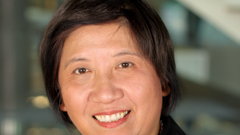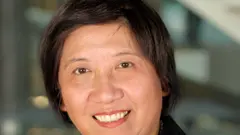
Wang Binying, currently serving as one of WIPO’s deputy director-generals, is widely regarded as the front-runner in the upcoming leadership election. [Photo: WIPO website]
Note: The following article is taken from the Chinese-language opinion column "The Real Point."
Washington is busy attempting to obstruct China’s nomination for the post of chief of the World Intellectual Property Organization (WIPO), a United Nations’ body set up to promote the protection of intellectual property. The organization is scheduled to elect its director-general in Geneva next week.
U.S. Secretary of State Mike Pompeo's team claims that it is absurd to allow China, a country that it accuses of IP theft, to lead an organization specialized in helping formulating cross-border intellectual property policies. White House trade adviser Peter Navarro said in a Financial Times article that the world shouldn't give China control of WIPO. Washington is also pressing some countries to give up their support for the Chinese candidate under the slogan of "Anyone But the Chinese," threatening to cut off assistance to those countries if they vote for Wang Binying, a veteran WIPO official who has worked for the organization for nearly three decades and who is currently serving as a deputy director-general of the body.
Since China joined the organization in June, 1980, it has been continuously strengthening its intellectual property protection effort and stepping up cooperation with the international community. Since the implementation of the Outline of the National Intellectual Property Strategy in 2008, China's comprehensive strength in and protection of intellectual property have significantly improved through revising rules and regulations governing patent, trademark and copyright as well as setting up intellectual property courts.
Strengthening intellectual property protection is not only the most important part of improving the country’s property rights protection system, but also the biggest incentive to improve China's economic competitiveness. According to statistics, between 2009 and 2019, Chinese scientists published 2.6 million papers in international journals, ranking second in the world. And in the WIPO 2019 Global Innovation Index Report, China moved up into the top 14 most-innovative economies. It was ranked 17 in 2018.
As pointed out by WIPO Director General, Francis Gurry, China’s active participation in the establishment of all the meetings, projects and systems of the organization is a huge support for the international property rights protection system. Wang Binying’s nomination shows China’s willingness to contribute to international intellectual property cooperation and development. The nomination of Ms. Wang, who’s widely seen as the most competent, competitive and experienced among the candidates, is in full compliance with the organization’s election procedures and meets the aspiration for stronger female leadership in international bodies to achieve gender equality in the international community.
Washington’s move to obstruct China’s nomination, in line with its consistent attempt to disrupt the world order and multilateral cooperation in recent years, stems from the Cold War mindset and a zero-sum game mentality. As an analysis published by a Japanese media outlet said recently, the United States has been haunted by a sense of crisis after seeing Chinese nationals taking major positions of some specialized agencies at the United Nations. As a major rule maker of the existing world order, the United States just cannot bear the fact that the power of decision making may be transferred into the hands of others.
Fair electoral competition is essential to the smooth operation of international organizations. The political farce of the United States interfering in the election of the WIPO director general would only harm the UN body’s credibility and future work if the U.S. act went unchecked.
 简体中文
简体中文

